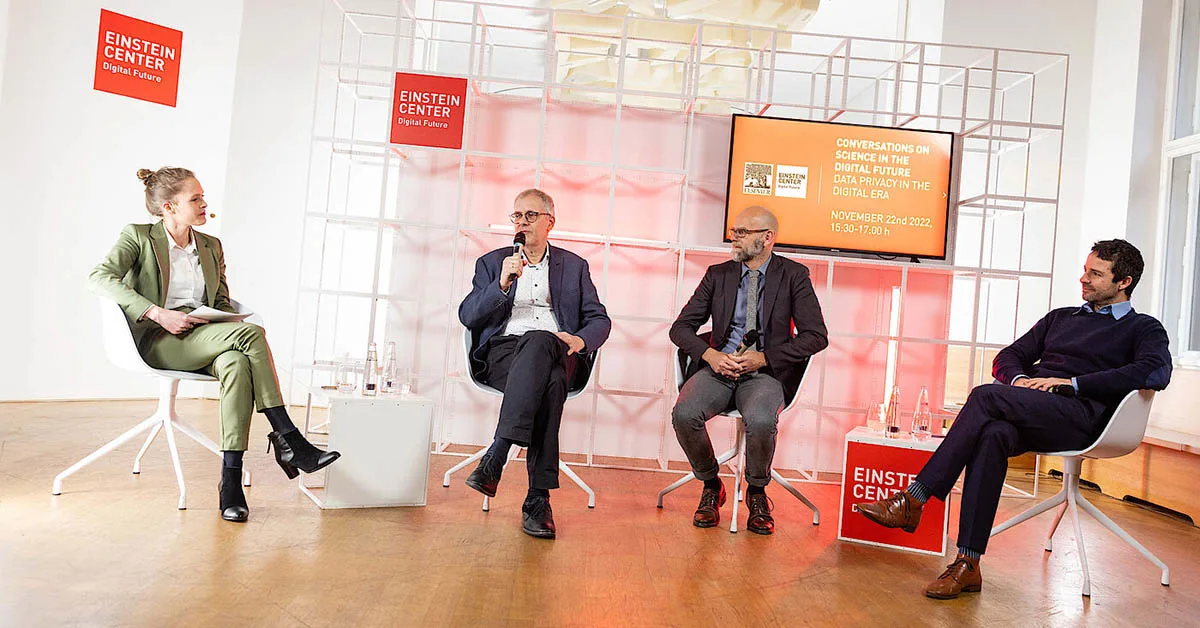New ECDF and Elsevier initiative to discuss data usage in the research sector
7 de março de 2023
Por Max Voegler, PhD

Hear from the first expert panel in the ‘Conversations on Science in the Digital Future’ series in Berlin
The number of platforms and services that provide research information and analytics, and the capabilities of these tools, continues to grow as computer power increases, technologies get more sophisticated, and the volume of research information and data expands.
Supporting the research community in this new digital era requires an open and proactive conversation about data usage in the research sector. Individual researchers and their institutions rightly want to know what data of theirs is being collected; how is it used, processed and shared; and the benefits to them.
That’s why, together with the Einstein Center Digital Future (ECDF), we have set up the “Conversations on Science in the Digital Future” initiative. ECDF and Elsevier have taken a central question as the impetus to foster the debate: How can scientists, academic institutions and publishers find the right balance between concerns for individual privacy, academic freedom and the use of innovative digital technologies?
As Dr Odej Kao, Professor of Computer Science at TU Berlin, and Speaker of the ECDF, explained:
One part of digitalization of research is aimed at innovation and developing solutions for current challenges. However, at ECDF, we also focus on the impact of an increasingly digitalized world on individuals and our society. When it comes to collecting data, ethical questions and privacy concerns need to weigh just as heavily as the benefits for researchers, their institutions and connected businesses.
This is exactly what we intend with this series: Transparent and diverse conversations on research data and its utilization in the digital era.
We hope these discussions will lead to greater understanding and collaboration between the research community, publishers and societies.

IJsbrand Jan Aalbersberg, SVP of Research Integrity at Elsevier, speaks on the first panel. (Photo © ECDF/PR/Felix Noak)
The first panel discussion on “Data Privacy in the Digital Era” was held in Berlin on November 22nd in front of a live audience at the ECDF building and online. A full recording of the discussion is available on the ECDF website.
A panel of experts from academia and industry led the discussion:
Dr Max von Grafenstein, Professor of Digital Self-Determination at ECDF and Berlin University of the Arts
Dr IJsbrand Jan Aalbersberg, SVP of Research Integrity at Elsevier
Prof Wolfram Horstmann, Head of Lower Saxony State and University Library Göttingen and Chair of the DFG’s Academic Library and Information Systems Committee (AWBI)
The event was moderated by journalist Katharina Heckendorf.
The discussion covered privacy, usage and user data, data sharing, and security. Highlights included debate around three key questions:
Highlight #1: How and why do information providers collect and store personal data?
Highlight #2: Are there any concerns with GDPR legislation?
Highlight #3: How do users retain control over their usage data and which purposes it is being used for?
Watch the whole video:
Data usage in the research sector

Watch now
|
Data usage in the research sector
What’s next?
Over the next several months, the series will take deep dives into current and impactful topics, including usage data in science, data privacy, vulnerable population and assessment data, and artificial intelligence and ethics in scholarly publishing. The hybrid events will take place at the ECDF in Berlin and online. To register your interest in joining the conversations, please email your full name, job title and organization to [email protected].
Contribuidor



